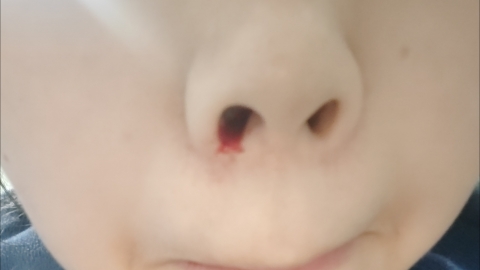What to do about a nosebleed
Generally, nosebleeds may be caused by factors such as dry air leading to mucosal damage, injury from picking or forcefully blowing the nose, allergic rhinitis, nasal mucosal ulcers, or abnormal blood clotting function. It is recommended to seek timely medical attention, identify the underlying cause, and then improve the condition through emergency measures, medication, and other treatments under a doctor's guidance. A detailed analysis is as follows:

1. Dry air causing mucosal damage: Prolonged exposure to dry environments can cause nasal mucosa to become dehydrated and brittle, making it prone to rupture and bleeding, commonly seen in autumn and winter. Immediately apply pressure to both sides of the nostrils with your thumb and index finger for 5–10 minutes to stop the bleeding, while applying a cold compress to the bridge of the nose to constrict blood vessels. In daily life, use a humidifier to maintain indoor humidity between 50%–60%, and use a saline nasal spray daily to keep the nasal cavity moist.
2. Injury from picking or forcefully blowing the nose: Frequent nose picking or forceful blowing can directly damage the nasal mucosa and capillaries, leading to bleeding. When stopping the bleeding, keep the head slightly forward and apply pressure to the nostrils. Correct these bad habits, and apply medical Vaseline ointment regularly to protect the nasal mucosa and reduce injury.
3. Allergic rhinitis: Exposure to allergens such as pollen or dust mites causes nasal mucosal congestion and swelling, making the mucosa prone to bleeding when irritated by inflammation, often accompanied by nasal itching and sneezing. After stopping the bleeding, follow your doctor's instructions to use medications such as budesonide nasal spray, cetirizine hydrochloride tablets, or loratadine capsules to relieve allergic symptoms, and avoid contact with allergens.
4. Nasal mucosal ulcer: Long-term inflammation or trauma to the nasal mucosa can lead to ulcer formation, where exposed blood vessels are prone to bleeding, often accompanied by nasal pain and a dry sensation. After stopping the bleeding, follow your doctor's instructions to use medications such as recombinant human epidermal growth factor gel, kangfuxin solution, or erythromycin ointment to promote ulcer healing.
5. Abnormal blood clotting function: A reduced number or impaired function of platelets leads to decreased clotting ability, making even minor nasal injuries prone to bleeding that lasts longer. Immediately apply pressure to the nostrils to stop the bleeding, and follow your doctor's instructions to use medications such as methylprednisolone tablets, leucogen tablets, or amphotericin B tablets to improve clotting function.
In daily life, drink plenty of water to maintain hydration, follow a light diet and reduce spicy foods. Avoid strenuous exercise to prevent physical irritation to the nasal mucosa. Practice proper nasal care, avoid contact with irritants, and adopt comprehensive lifestyle adjustments to reduce the frequency of nosebleeds and maintain nasal health.







